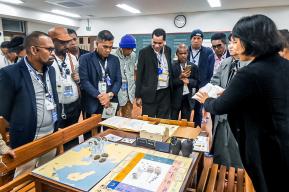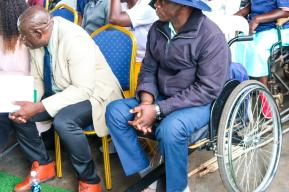News
Mauritius reviews its cultural and creative industries sector to demonstrate how cultural policies are guiding sustainable development

As part of a new UNESCO project, the Ministry of Arts and Culture in Mauritius is forming a National Team to examine the status of the cultural and creative industries sector over the past four years, and prepare a national report, in consultation with a wide range of stakeholders, on the impact of national cultural policies and best practices to be shared.
The UNESCO project “Reshaping Cultural Policies for the Promotion of Fundamental Freedoms and the Diversity of Cultural Expressions”, funded by the Swedish International Development Cooperation Agency (Sida), aims to strengthen the human and institutional capacities of governmental and civil society actors in order to monitor and report on policies and measures that protect and promote the diversity of cultural expressions in Mauritius.
The UNESCO project will be officially launched on 10 October 2019 by the Minister of Arts and Culture, H.E. Mr. Prithvirajsing Roopun alongside Ms. Christine Umutoni, the United Nations Resident Coordinator in Mauritius. Activities will run through 2021 and include: specialized expertise in the organization of multi-stakeholder consultations including governmental and civil society actors; trainings on data collection and analysis; inter-ministerial cooperation; and public debates on emerging topics such as gender equality in the culture sector, media diversity or artistic freedom.
A three day national consultation meeting and training workshop was organized by UNESCO and the Ministry of Arts and Culture for participants from the national team and key stakeholders in order to present the 2005 Convention on the Protection and Promotion of the Diversity of Cultural Expressions, promote the participatory policy monitoring process, and introduce the form to be filled out for the quadrennial periodic report (QPR), an obligatory report submitted by Parties to UNESCO’s 2005 Convention every four years.
“The QPRs, which contain detailed responses on the current state of cultural policies and the cultural and creative sectors, reveal achievements and challenges encountered by countries over the past four years,” said Ms. Karalyn Monteil, Programme Specialist for Culture at the UNESCO Regional Office for Eastern Africa. “The importance of preparing the report in a participatory manner, involving non-governmental actors and creative workers, is at the heart of the Convention,” she added.
Mauritius’ QPR will provide a state of the art of the implementation of the 2005 Convention’s Goals and the United Nations Sustainable Development Goals by both national authorities and civil society organisations, as well as recommendations for future policy action to address the challenges and priorities identified by the National team.
Since ratifying the UNESCO 2005 Convention in 2006, Mauritius has steadily developed various policies and measures to promote the cultural and creative industries, including a White Paper on Arts and Culture, a National Arts Fund and a draft legislation on the Status of the Artist.
Over 50 cultural policymakers from the Ministry of Art and Culture, creative workers, artists, civil society and media are participating in the three-day training and awareness-raising workshop, which is being led by Prof. Vesna Copic from UNESCO’s Expert Facility together with Dr Hans Lallah Ramduth, a national expert, both of whom were engaged by UNESCO to lead the national team in elaborating Mauritius first national periodic report in a participatory manner.
The Ministry plans to present a draft of the report to the public for final inputs and comments during a validation meeting prior to the submission due date on 30 April 2020.
Links/URLs:
2005 Convention on the Protection and Promotion of the Diversity of Cultural Expressions




